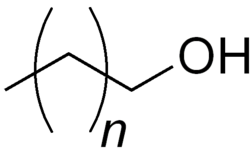Chemistry:Policosanol
 | |
| Clinical data | |
|---|---|
| AHFS/Drugs.com | International Drug Names |
| ATC code | |
| Identifiers | |
| |
| CAS Number | |
| ChemSpider |
|
| Chemical and physical data | |
| Formula | CH3-(CH2)n-CH2OH n=24-34 |
| Molar mass | (variable) |
| | |
Policosanol is the generic term for a mixture of long chain alcohols extracted from plant waxes. It is used as a dietary supplement.
History
Policosanol was originally derived from sugar cane but the chemicals can also be isolated from beeswax, cereal grains, grasses, leaves, fruits, nuts, and seeds of many foods.[1] Plant waxes consist of long chain alkanes and their derivatives, including long chain fatty acids and alcohols.[2] Policosanols are very long chain alcohols with carbon backbones ranging from 24 to 34 carbons.[1]
The first policosanol supplements were produced by Dalmer Laboratories in Cuba; studies conducted and published by that group have found that policosanol is safe and effective as a lipid-lowering agent. However these studies were small, and efforts by groups outside of Cuba have failed to replicate these results.[1]
Safety and efficacy
A meta-analysis in 2005 concluded that human policosanol consumption is safe and well tolerated and is effective at lowering the blood cholesterol.[3] As of 2010, they were marketed as lipid-lowering agents in the Caribbean, Central and South America, and Canada.[1] Furthermore, another meta-analysis published in 2018 with 22 studies and 1886 subjects showed policosanol could improve dyslipidemia with raising HDL.[4] The blood pressure lowering effect of Cuban policosanol has been shown in an animal model using spontaneously hypertensive rats (SHR)[5] and a human trial.[6][7]
References
- ↑ 1.0 1.1 1.2 1.3 "Policosanols as nutraceuticals: fact or fiction". Critical Reviews in Food Science and Nutrition 50 (3): 259–267. March 2010. doi:10.1080/10408391003626249. PMID 20301014.
- ↑ "Chemistry and morphology of plant epicuticular waxes". The Plant Cuticle. London: Academic Press. 1982. pp. 139–165. ISBN 0-12-199920-3.
- ↑ "Meta-analysis of natural therapies for hyperlipidemia: plant sterols and stanols versus policosanol". Pharmacotherapy 25 (2): 171–183. February 2005. doi:10.1592/phco.25.2.171.56942. PMID 15767233.
- ↑ "Efficacy and safety of sugarcane policosanol on dyslipidemia: A meta-analysis of randomized controlled trials". Molecular Nutrition & Food Research 62 (1): 1700280. January 2018. doi:10.1002/mnfr.201700280. PMID 28730734.
- ↑ "Blood Pressure Lowering Effect of Cuban Policosanol is Accompanied by Improvement of Hepatic Inflammation, Lipoprotein Profile, and HDL Quality in Spontaneously Hypertensive Rats". Molecules 23 (5): 1080. May 2018. doi:10.3390/molecules23051080. PMID 29751583.
- ↑ "Consumption of Cuban Policosanol Improves Blood Pressure and Lipid Profile via Enhancement of HDL Functionality in Healthy Women Subjects: Randomized, Double-Blinded, and Placebo-Controlled Study". Oxidative Medicine and Cellular Longevity 2018: 4809525. 2018. doi:10.1155/2018/4809525. PMID 29854085.
- ↑ "Long-Term Consumption of Cuban Policosanol Lowers Central and Brachial Blood Pressure and Improves Lipid Profile With Enhancement of Lipoprotein Properties in Healthy Korean Participants". Frontiers in Physiology 9: 412. 2018. doi:10.3389/fphys.2018.00412. PMID 29765328.
External links
- Policosanol at Drugs.com
 |
